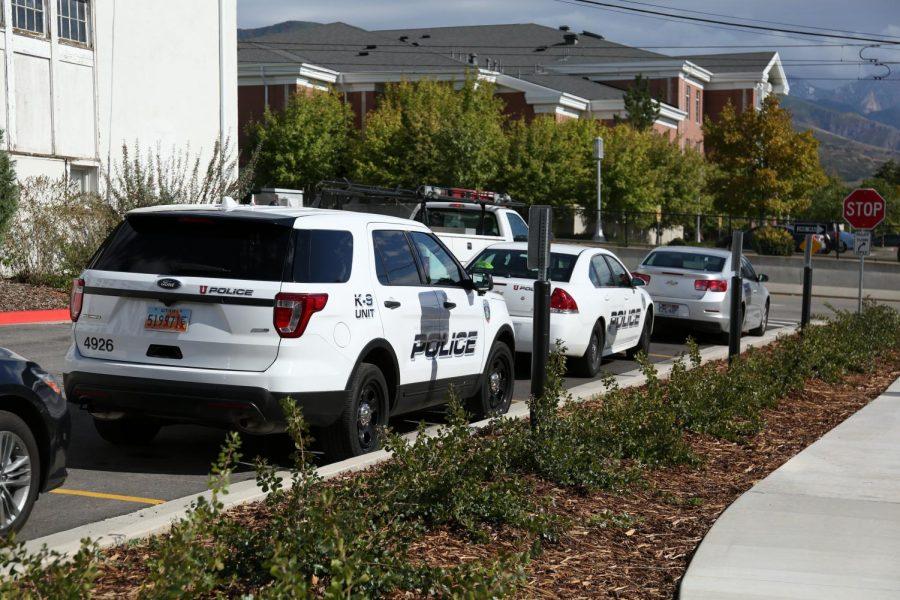Privacy Invasions and Housing and Residential Education: An Update on the Officers Circle Security Cameras
October 29, 2019
It was late and cold at the University of Utah’s Petersen Heritage Center, where a town hall was held on Oct. 15. Several students were enraged about cameras being installed in their homes at Officers Circle. For them, the feeling of being seen at all times could be detrimental and could host unforeseen psychological consequences to the point of impeding their academic lives. This violation of privacy dissolved the intention of campus housing to protect their safety.
The meeting was hosted by Barb Remsburg, the campus’s Housing and Residential Education director, and Todd Justesen, the office’s residential education director, at 9 p.m. on the 15th. The town hall was held in response to student residents that became unsettled after realizing the security cameras would be installed inside their homes on Sept. 17. They believed the devices would be placed outside after receiving notice in late August by the HRE department.
The town hall was meant to address how the cameras will work, why they were installed inside, who is authorized to view the footage and other future plans such as updating doors on Officers Circle to include a card swipe. A total of 14 students attended the community meeting.
After Lauren McCluskey was killed on campus on Oct. 22 of last year, safety concerns have escalated and have changed the way students behave. For example, in September, The Daily Utah Chronicle discovered that calls for safety escorts skyrocketed by 83% for the rest of the academic year after McCluskey’s death.
In the crowd was Bryn Dayton, one of the residents against the presence of the cameras inside his home at the Alliance House. The environment of the Alliance House is tailored for LGBTQ+ residents to feel safe and comfortable. He does not think this is the case anymore. “The purpose of me trying to get into that house was so that I feel safer,” he said. “We’re letting the police into this house of people who have been targeted by police in the past.”
According to HRE, the entire infrastructure, security installation and consultation for the security system at Officers Circle cost a million dollars. Funding for the plan was approved this past July when the budget allocation of different departments from the U begins for the academic year.
Questions of why the system resides inside the homes were answered: to protect the historic status of the houses. Constructed in the 19th century during the Civil War, a staff member of Utah’s Historic Preservation Planning Division advised against placing the cameras outside. Erik Fronberg disagreed. As an urban planning student, he has worked with the preservation department and noted that finding options to move the cameras outside “isn’t unreasonable.”
Fronberg started a petition based on invasive privacy concerns. He stayed up the entire night with another resident working on a petition. The next day, 20 signatures appeared in the first hour of his visit to a home in Officers Circle.
This student privacy issue has been highly publicized, as KUTV, a local TV news station, directly reported on the petition and created a segment highlighting the concerns made by Fronberg.
After submitting the petition to HRE, all residents received an email acknowledging the power of their voices and how important it is to listen to the valuable ideas and feedback of residents; however, they were still committed to finishing the installation of the security system. Immediately, students wanted to schedule a town hall with HRE. Some even considered holding a sit-in at the HRE office.
It was pointed out during the Q&A portion of the event that the unremitting physical nature of feeling monitored — during dinner or doing laundry — could potentially have negative psychological effects on residents.
“So there are these big high-profile cases of physical violence and how that impacts safety,” Fronberg said. “It’s probably a conversation that didn’t happen given the science emerging, but perceived observation on students is real.”
The decision to equip residence halls with cameras has been developed since 2013 to address problems that emerged on the Risk Resident Satisfaction Survey rather than a direct pipeline of concern based on McCluskey’s murder.
“They’re not living right here now,” one of the audience members said. Several heads in the crowd nodded with agreement.
Justesen explained how several students in the meeting attended on the basis of learning more about the security system, curious to know how it would appear on the screen for only HRE directors and campus police. After showing it to students, some left the meeting.
The day after the meeting, in the HRE administrative offices, Justesen showed the cameras with the privacy blockers applied. “Ninety-five percent of the time, the footage will be used for break-ins, theft or in the rare cases where the campus police will need to review footage,” he said. “The other times will be used as a brief weekly review.” Instead of a continuous film stream, the camera will only turn on if it detects movement in the shot unaffected by the gray privacy blocker.
Wrapping up the almost two-hour meeting, residents focused on other issues affecting their everyday living, like inconvenient parking and ground management of bushes and trees around the Officers Circle homes. Around 10:30 p.m., many people exited the meeting, some visibly unsatisfied.
On Monday, Oct. 21, HRE sent an email to Officers Circle residents with a Town Hall followup, saying that they plan on re-assessing the placement of the cameras to see if they can be moved closer to the entrances. HRE will work with Commuter Services to see if more parking spots can be open for residential use and they will evaluate new name tag/badge options for maintenance and reinforce entry expectations with facilities staff members.
In an interview after the town hall, Fronberg believed the event gave opportunities to tackle the cameras in a productive manner while still disclosing the residents’ agreement with the school’s safety plan. He also disclosed that it wasn’t enough and he hopes HRE understands how the presence of cameras, like the one posted on the kitchen wall, “affects us all on a daily basis,” he said. “It’s hard to get it off your mind.”








